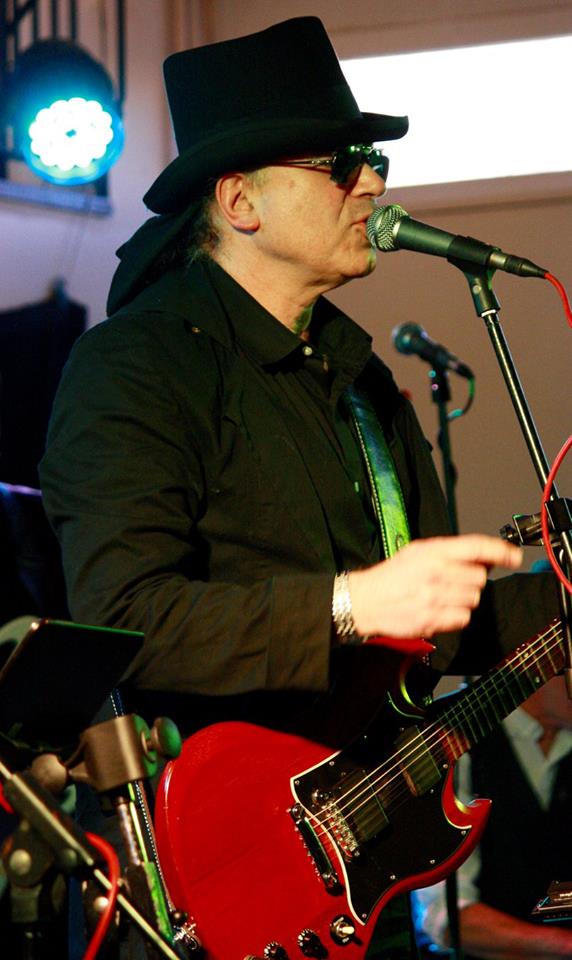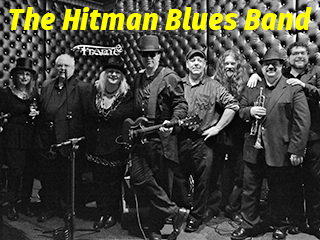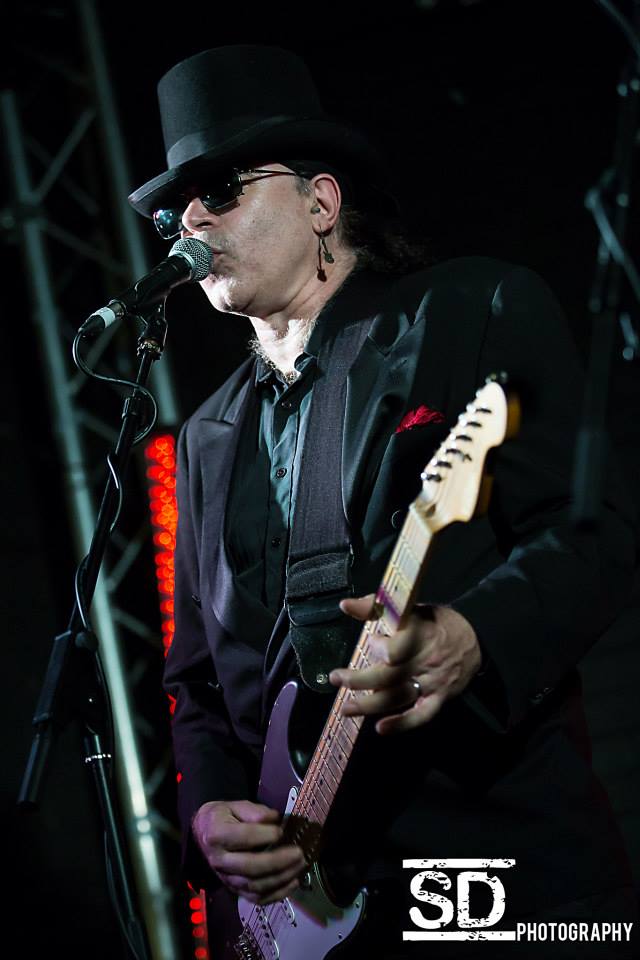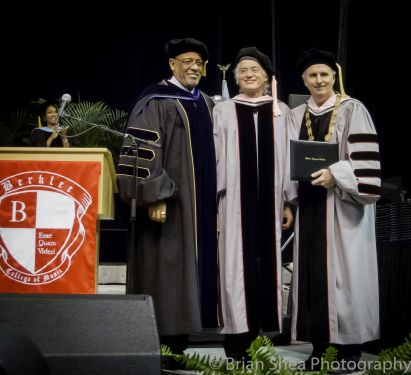
(Photo by Graham Chapman)
"Russell will be here in a second" announces the gentle voice and the smile of Joanne Alexander, member of The Hitman Blues Band and, most importantly, wife of Russell "The Hitman" Alexander, frontman and band leader of this fabulous collective from New York. The band has released just few months ago one of the most entertaining albums of the 2016, The World Moves On (previously reviewed on our website) and Bluebird Reviews couldn't miss the chance to meet and discuss about the new album with The Man Himself, Russell Alexander.
We meet the band in one of their European dates, more precisely in London, UK, in one of the most iconic and historic venues of the UK capital, The 100 Club. Alexander is immaculately dressed in his stage suite with his typical Blues Top Hat that he loves to feature almost every time that he performses and welcomes Bluebird Reviews with a huge smile and warm handshake.
BBR - Russell, welcome on Bluebird Reviews and many congratulations on your new album The World Moves On. How long did it take to assemble together the tracks, old and new that ended up on your new record?
RA - All together, probably about three or four months. I started the pre-production in January, then got few things sorted and then we started recording in February. The record had to be done by the end of March. I was told by my publicist that end of March was the ultimate deadline and if we didn't have the record ready by the beginning of April, there would have been no promotion opportunities for the forthcoming tour at all. As you can understand, no pressure at all! (giggles). But despite all that, I am very happy about the end result and everything worked out really well.
BBR - The Blues has been defined, through the years, in many different ways. How would you define, in your own words, your very personal take on this genre that you like to call Original Modern Blues?
RA - See, the blues is a collective genre. You can go back all the way to the W.C. Handy days and then do a kind of progression up, by going through artists like Bessie Smith, Lonnie Johnson, Blind Willie McTell, Charlie Patton and then moving another notch to people like Johnny Guitar Watson, Elmore James, Howlin' Wolf. By creating such a great music platform, the artists belonging to the rock scene grabbed on and said "Oh, so this is where our genre come from!". Finally understanding where all this started, the rock artists made their own things, filling the gap, through their artistry, between the Chicago Blues style and the rock scene, based on the roots created by the artists I mentioned before. People like Fleetwood Mac, Cream, Eric Clapton, then as the days went by, guys like Johnny Winter, Jimi Hendrix, Stevie Ray Vaughan did so really beautifully. All of us musicians apply our visions to what we consider blues because we all have a different view about what blues is. Even Stevie Ray Vaughan, back in those days, he was told: "Man, that is not blues". But sure it was, it was performed just in a different way. If we want the blues to survive and I am certain that it will survive, it has to evolve because any music genres need evolution, including the blues, otherwise it's going to disappear.
BBR - During the making of The World Moves On, did any of the songs change their shape, whilst you were recording the album?
RA - A lot of times that does happen but on this particular album it didn't. When I walked into the studio, I knew already pretty much how I want the album to sound like. We had a keyboardist, Kevin Bents, who came in and threw in a lot of his own ideas. Some of the songs were starting in a way and finishing in a completely different way. That was the way we used to work on some of our earlier albums and if you hear the original demos of those albums and the way the tunes actually came out, they were completely different. But this one was pretty smooth and I have gotta say I might be finally getting the hang of it at this point, I am not sure but I feel I am getting there (smiles).
BBR - The band has been together for quite some time, now. How much has the sound of The Hitman Blues Band developed, through the years?
RA - Well, as you know I had many different players with me over the years. I started the band in 1989 and at the time, it was merely a cover band. Since those days, I went into a lot of changes of personnel and I believe that the only musician that has been with me the longest is Mike Porter (bass guitar), which has been with me for 12-13 years. I have worked previously with Mike Snyder, who is now playing with us both Baritone Sax and keyboards, many times before, since the mid-80's in different other projects but not on a long running like with Mike. This new record is a bit like the sum of our history, as Hitman Blues Band. You can hear in it new versions of songs from my previous records, like Catch 22 Blues from my very first album. That tune has got a special meaning for me, because I had the honour of having my father (Ray Alexander, excellent jazz artist) playing with me, which was a real treat. But then, if you compare, say, that track to the newer stuff, something like I'll Be Moving On or The World Moves On, for example, you can certainly hear the different approach we had on the new songs in comparison to the older one we revisited on the album. I guess that approaching songs in a different way, through time, is part of the evolution of any artist. One great thing was that, once I heard the job that the Team did in re-mixing and re-mastering versions of the older tunes, I was over the moon. Some of those tunes go back all the way to 2000 and it is amazing how fresh and so contemporary they sound still now

BBR - Our viewers are very interested to know about the genesis of your nickname The Hitman, Russell. They really hope you have never shot anybody in your life!
RA - No, I can reassure you on that. "They called me Hanging Johnny, away boys away but I never hang nobody" (Hanging Johnny by The Great Big Sea). I have got that nickname first because I knew so many tunes from the blues charts, back in the days, stuff from, I don't know, 1920s to 1970s all by heart. As you get older, however, you tend not to keep up quite as much as when I was younger and due to the fact that I am so focused and concentrated now with my band, you obviously lose, through time, any incentive to keep up with the Blues Charts and all that. The way that I dressed, also, already back in the mid-late 80's was very much noticed by the fans. I remember, in that period, a friend of mine coming to see me playing in an open jam session and when I walked on stage, he shouted "Hey, look, here comes The Hitman". So I thought that, considering that so many people called me in that way for many different reasons, it was wise for me to keep that name and that is what I did.
BBR - When we reviewed your record at Bluebird Review, we truly admired the capacity of the band to stick religiously to the tradition of the blues and at the same time, the ability to spice up that sound through your personal artistic touch. Which blues artists have inspired you and made you love so much this genre from the beginning?
RA - Oh boy, how long have you got? That's a huge list to make because there are so many different kind of blues. All the different styles of people like Robert Johnson, Blind Willie McTell, Charlie Patton, just to mention very few, they had such a big impact on my musical formation. But that is not all. If you go through each decade of blues with me, I can go on for hours. Maybe the first time I was really exposed to blues, as genre, was by listening in my young age to people like Cream, Canned Heat, Jethro Tull and a lot of Progressive Rock. One day I started listening to Elvis Presley's Sun Session album and I was amazed by how that album was based on blues. Through the years, then, people like Stevie Ray Vaughan and The Blues Brothers revitilised the interest about blues even further and that was really a cool moment for the genre. Then I started working my way backward, musically, discovering, a bit like the rock artists of the 70's I mentioned previously, that the fundament, the ground of that music was the blues. I guess that this is one of the positive sides of getting older. You get a bit more patient, sit down and dig deeper into the sound that was the genesis of what came after. It gives you the opportunity to appreciate where all started and how it started, something that when you are a younger and maybe blinded by the current music you hear on the radio, you don't consider at all.

(Photo by SD Photography)
BBR - How come that you decided to add to the new album five re-worked tracks from your previous records and not doing an album of all original material?
RA - I had a lot of people saying to me "Hey, you have got these older albums with plenty of great tunes, you should really consider to re-release them because they really sound cool. I had already some new songs ready and I didn't want to make an album made entirely of my old tunes either. So, we asked to the fans and we also discuss within the band which songs of our back catalogue would have been more appropriate to be chosen for this album and in the end, I have got to say I am pretty happy with the ones we chose.
BBR - Russell, you have been in Europe to play many times before. How different do European audiences react to your music in comparison to American ones?
RA - The typical answer would be that in Europe they are much more respectful, they listen carefully to the songs and so on. In reality, I don't think that there is so much difference between European and American audiences because our American fans can be as respectful as the European crowds. I also think that, another similarity we find often in our crowds is the amount of loudness, which is mostly the result of how much alcohol consumption there has been on a particular show, it doesn't matter where you are! (chuckles). There is also a fair amount of dancing but, again, it would be entirely depending by how much the crowd would be sober or not sober. Either way, what I generally find awesome about any type of audiences is that they will come and listen to the blues, no matter if it is Delta, Chicago Blues or any other kind of. Because it's the spirit of the blues that bonds them together, it's not important matter of what nationality they can be or their blues preferences. They come just and only for the blues, because they find a connection with it. They come because they want to support it and feel connected to it. Most of all, they want to see it performed live and feel the power of the blues.
Giovanni "Gio" Pilato

